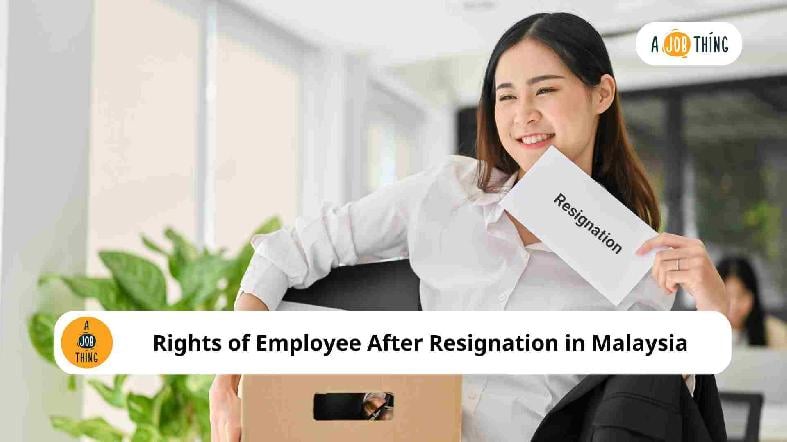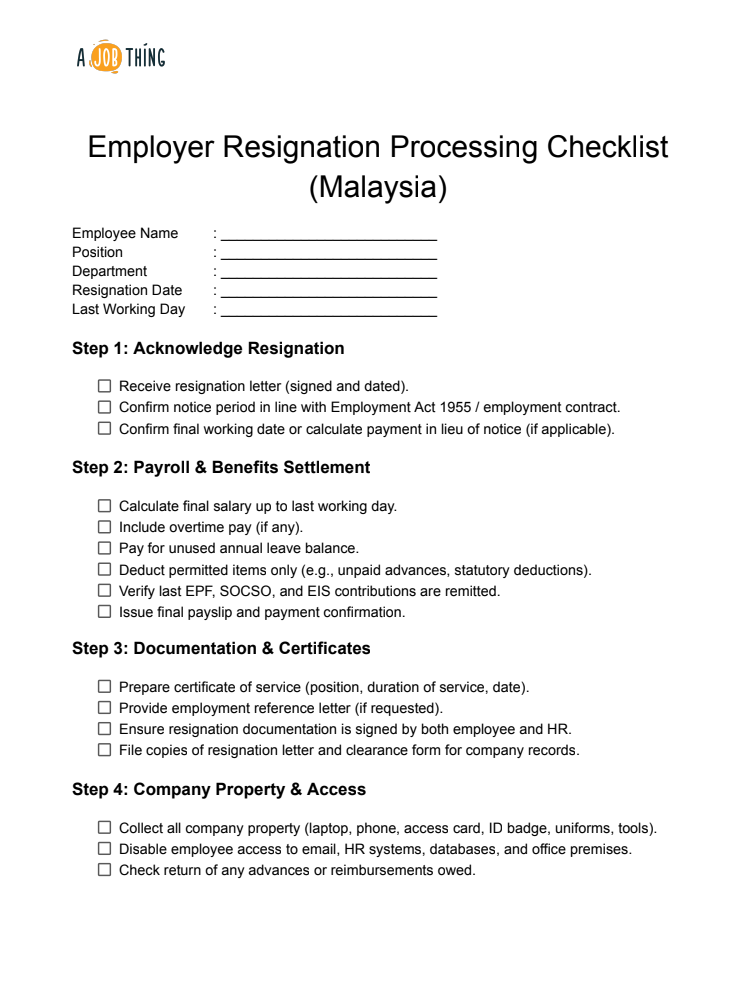
Rights of Employee After Resignation in Malaysia
Are You Hiring?
Find candidates in 72 Hours with 5+ million talents in Maukerja Malaysia & Ricebowl using Job Ads.
Hire NowRespecting employee rights is at the core of fair employment practices. In Malaysia, these rights are protected by the Employment Act 1955 and related laws, covering wages, working hours, leave, safety, and termination.
For employers, it also means handling resignations and workplace transitions with professionalism and legal compliance. This article provides a clear overview of employee rights and how to manage them effectively, especially when employees decide to resign.
What are Employee Rights in Malaysia?
Employee rights refer to the legal entitlements that employers must provide to their staff during employment and even after resignation. These rights are designed to ensure fair treatment, protect workers from exploitation, and create safe, equitable workplaces.
The Employment Act 1955 is the main law governing employee rights in Malaysia, especially for employees earning RM4,000 and below (with some protections extended to higher earners). Other laws, such as those governing the Employees Provident Fund (EPF), Social Security Organisation (SOCSO), and Employment Insurance System (EIS), also provide statutory rights and protections.
Key Rights of Employees in Malaysia
Employee rights cover every stage of employment, from wages and working hours to leave entitlements, termination procedures, and resignation. Being aware of these rights is essential to maintain compliance and treat employees fairly.
Wages and Salary
Employees are entitled to:
-
Timely payment of wages: Salaries must be paid no later than the 7th day after the end of the wage period.
-
Overtime pay: Employees covered under the Act are entitled to overtime wages at prescribed rates for hours worked beyond the standard.
Working Hours and Rest Days
-
Standard working hours are capped at 45 hours per week (max 8 hours per day).
-
Employees are entitled to one rest day per week.
-
Reasonable meal breaks must also be provided.
Leave Entitlements
Employees are entitled to minimum statutory leave, which employers must honour:
-
Annual leave: 8 to 16 days depending on years of service.
-
Sick leave: 14 to 22 days per year, plus up to 60 days of hospitalisation leave.
-
Maternity leave: 98 days of paid maternity leave for eligible employees.
-
Paternity leave: 7 consecutive days for married male employees.
-
Public holidays: At least 11 gazetted public holidays, with 5 compulsory (e.g. National Day, Malaysia Day, Agong’s Birthday).
Employment Protection
Employees are entitled to fair treatment throughout their employment, including when they choose to resign. Key protections include:
-
Probation rights: Probationary employees must also be treated fairly and cannot be dismissed without due process.
-
Right to resign: Employees may resign by serving notice as per contract or by paying salary in lieu of notice.
-
Notice of termination: The length of notice depends on contract or statutory requirements. Employers cannot reject a valid resignation letter.
-
Entitlements after resignation: Employees are entitled to final salary, payment for unused leave, and contributions to EPF, SOCSO, and EIS up to their last day.
-
Certificate of service: Upon request, employees should be issued a certificate stating their role and duration of employment.
Health and Safety
Under the Occupational Safety and Health Act (OSHA), employers must:
-
Provide a safe working environment free from hazards.
-
Supply necessary equipment, training, and supervision.
-
Ensure employees are covered under SOCSO for workplace accidents and injuries.
Other Benefits & Contributions
Employers are legally required to contribute to:
-
EPF (Employees Provident Fund): Retirement savings contributions.
-
SOCSO: Employment Injury Scheme and Invalidity Scheme (for locals).
-
EIS: Financial support for employees who lose their jobs involuntarily.
Employees are also entitled to equal opportunity and protection from workplace discrimination based on gender, race, or religion.
Employee Rights After Resignation
When an employee resigns, their rights do not end immediately. Employers must ensure all entitlements are properly settled to avoid disputes or legal claims. These include:
-
Final salary: Must be paid within 7 days of the last working day.
-
Unused leave compensation: Any accumulated annual leave must be paid out.
-
Statutory contributions: EPF, SOCSO, and EIS must be updated until the last salary cycle.
-
Certificate of service: Employees have the right to request a written certificate of employment.
-
Respect for notice period: Employers cannot force employees to leave earlier unless both parties agree, or pay in lieu is arranged.
Why Employers Should Respect Employee Rights
Employers who prioritise fair treatment often see benefits that go far beyond compliance:
Legal Compliance
Following the Employment Act 1955 and related regulations protects companies from costly lawsuits, fines, Industrial Court disputes, and even potential business interruptions due to non-compliance.
Retention and Productivity
Employees who feel valued and fairly treated are more motivated, loyal, and productive. Respecting rights reduces turnover, minimises absenteeism, and creates a stronger, more stable workforce.
Employer Branding
In today’s competitive job market, companies known for respecting employee rights stand out as employers of choice. This reputation helps attract top talent, improve client relationships, and strengthen trust with stakeholders.
By embedding respect for employee rights into company culture, employers can create a workplace that is legally compliant, highly engaged, and socially responsible.
Downloadable Checklist / Template
Below is a complete step-by-step checklist that you can use as reference in your company.

Free Download Employer Resignation Processing Checklist (Malaysia)
FAQs
What rights do employees have under the Employment Act 1955?
They are entitled to wages, rest days, annual leave, sick leave, public holidays, termination notice, and protection from unfair dismissal.
Are all employees in Malaysia covered under the Employment Act?
The Act mainly covers employees earning RM4,000 and below, but certain provisions (like maternity leave and unfair dismissal protection) apply to all employees regardless of salary.
Do part-time and contract employees get the same rights?
Yes, part-time and contract employees are covered by the Act, though benefits like leave entitlements are calculated on a pro-rata basis.
What happens if an employer violates employee rights?
Employers may face fines, legal action at the Industrial Court, orders to reinstate employees, or pay up to 24 months of back wages.
Can employers offer more benefits than the minimum legal requirement?
Yes. Many employers offer benefits above the statutory minimum (extra leave, bonuses, insurance) to remain competitive and improve employee satisfaction.
Struggling to Attract Quality Candidates?
Let AJobThing boost your hiring game. Post once and get visibility across Maukerja & Ricebowl – all from one platform.
Read More:
- How Working Days are Defined and Applied in Malaysian Workplaces
- Guide to Leave Entitlements in Malaysia under Employment Act
- Leave Management System for Malaysian Employers – Track Leave Easily (Free Template)
- Cuti Tahunan Pekerja Swasta 2025 Explained for HR and Employers
- Malaysia Working Hours Regulation 2025: Key Updates
- Malaysian Public Holidays (Cuti Umum Malaysia) 2025
- Minimum Hourly Wage in Malaysia 2025: Latest Rates & Calculation
- Retrenchment, Voluntary Separation Scheme (VSS) and Mutual Separation Scheme (MSS): Choosing the Right Path

